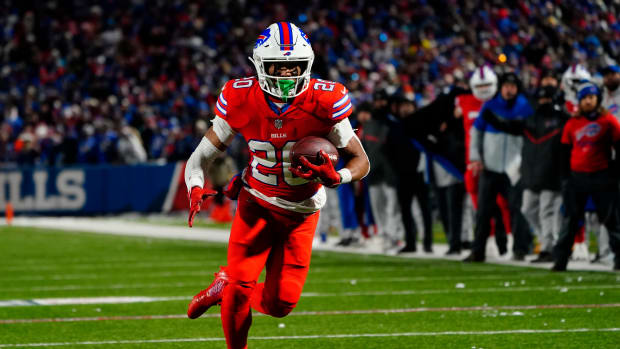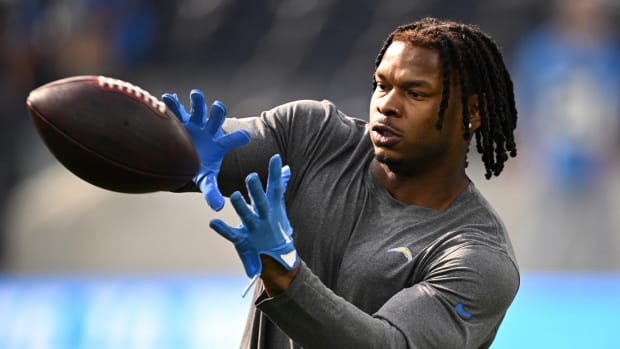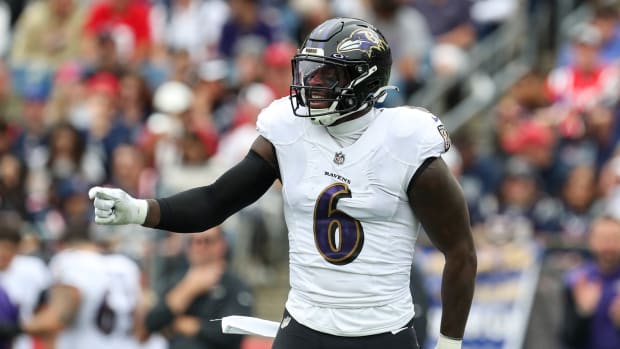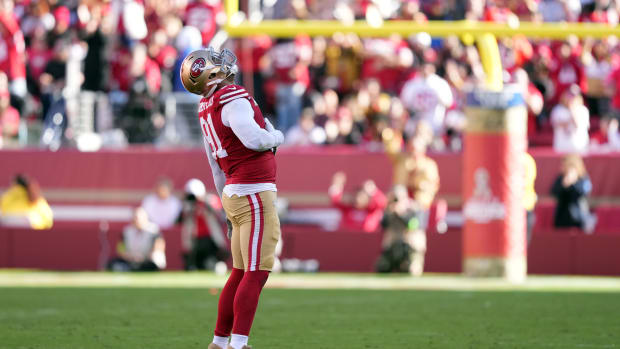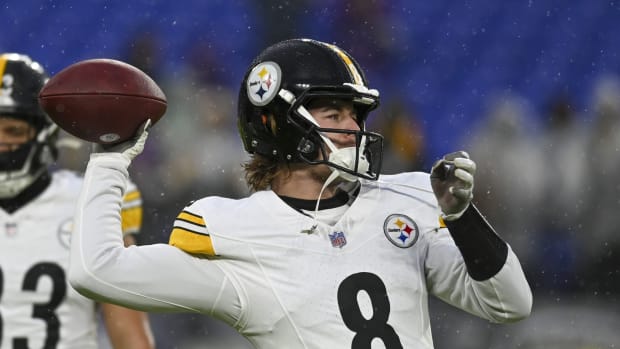The Dysfunction In D.C.
With Washington sitting at 3-10, Mike Shanahan decided to bench star quarterback Robert Griffin III in favor of backup Kirk Cousins for the remainder of the season. (Alex Brandon/AP)
The NFL certainly is putting the “fun” into dysfunction these days. In a season where we have seen what usually are internal issues bleed into public view—from the divorce in Tampa Bay between coach and starting quarterback to the exposure of the seamy underbelly of the Dolphins’ locker room—the spotlight now shifts to the passive-aggressive drama between Washington head coach Mike Shanahan and superstar quarterback Robert Griffin III.
In their public comments throughout the past year, I have never sensed these two faces of the franchise are on the same page. There always appears to be disconnect. The current situation is no different.
The decision
It is the ultimate irony that Shanahan—by inserting Kirk Cousins into the starting lineup for the remaining three games of a forgetful season—is protecting the future health of Griffin. After having little hesitation to play an injured Griffin a year ago and risk his long-term availability, Shanahan is now making him a healthy scratch. What a difference a year makes.
One interesting revelation from Shanahan’s press conference Wednesday was his defecting blame at the decision to allow Griffin to continue to play on an injured leg in last year’s playoff game, leading to serious injury. It previously appeared that an eager player and a win-now coach overruled the team doctor, the esteemed Dr. James Andrews. Now, Shanahan provides a different narrative: it was the eager player and doctor overruling the cautious and concerned coach.
Inferring the decisions as a correction learned from last year, Shanahan is proactively sitting Griffin to allow him full participation in the 2014 offseason program. While many speculate that this is a move to provoke a reaction from owner Daniel Snyder—who has wisely stayed above the fray—my sense is this is more personal to the quarterback rather than an affront to the owner. In fact, Shanahan said he ran the decision to bench Griffin past Snyder, and the owner said he wouldn't stand in the way of the coach's lineup decisions.
I do not think this is a move by Shanahan to get himself fired; I think this is a move to try to put a player in his place because Shanahan perceives him as (1) becoming bigger than he should and (2) not playing well. To me, this decision speaks to a demotion of Griffin for both on-field and off-field reasons rather than an admission of error in playing him last January and rushing him back for a subpar 2013 season.
The backup
I have long thought the selection of Kirk Cousins in the fourth round of the 2012 draft was a poor choice. Cousins, who was professional and deferential in his comments Wednesday, might go on to have a long and productive career as an NFL quarterback. But this is not about Cousins; this is about wasting a draft pick on a position where several draft picks were just exhausted.
Washington clearly went all-in on Griffin, selling off three first-round picks and a second-round pick for him. And having just spent four highly valuable draft picks on a quarterback, Washington then drafts ... a quarterback?
While Griffin is a potential star, Washington sorely needs the depth that multiple draft picks provide. Successful teams have an infrastructure of young and ascending players at fixed and reasonable costs to balance spending on star veterans. When a team mortgages multiple picks as Washington did for Griffin (or the Falcons did for Julio Jones), the hidden downside is weakened depth.
I have heard the narrative of “Well, they can get value for Cousins in a trade!” And yes, when I was in Green Bay we ended up trading draft picks such as Matt Hasselbeck and Aaron Brooks. However, those players were drafted behind an older, established quarterback with eventual succession a possibility.
Cousins clearly is not the future in Washington and he realizes that; he plays the same position as a player on which the team has bet the future. Simply, if Kirk Cousins is starting beyond this month, the team has a lot bigger problems than what is going on now.
Owner Daniel Snyder (center) and coach Mike Shanahan mortgaged the future of the franchise to trade up and select Robert Griffin III in the 2012 NFL Draft. (Rod Aydelotte/AP)
The owner
I grew up a few miles away from Dan Snyder and, like him, have many fond childhood memories of going to RFK Stadium with my father and rooting on our team. Over the years, mainly due to working for competing teams, I lost my fandom. Snyder not only continued to be a fan, but also bought the team.
Snyder and Shanahan appeared to have a close relationship through the early part of their partnership in Washington, even taking vacations together with their wives. Yet when asked last Sunday about his relationship with Snyder, Shanahan said, “This is not the time or place to talk about it.” Translation: “It’s not good.”
Although it's not clear when the Snyder-Shanahan relationship soured, my sense is it involves Griffin. Snyder has shown a history of being enamored with his star players, and the Snyder-Griffin relationship might have developed to the point where Griffin feels he is empowered to turn to the owner at any time, for any reason. If true, that must infuriate Shanahan.
To be fair, Griffin is not the only NFL star player to be treated differently by management and ownership. The NFL is not a democracy. Do we believe that if a lesser player did what, say, Riley Cooper or Aldon Smith did, they would still be with the Eagles or 49ers? Of course not.
In my experience with a franchise player, Brett Favre did have some special privileges later in his career, but I never felt that he abused them. I remember sitting with Brett one day and he said, “Andrew, I really appreciate how you allow my dad to be around here so much.” I responded, “Brett, your father could be Charles Manson and we would allow him to be here.” He looked at me a bit cross-eyed, but he got my point: for a player that moves the needle for the team, the team will, at times, grant special treatment.
The general manager
Strangely silent in this passive-aggressive difference of opinion is general manager Bruce Allen. Generally, it is my view that Allen has been successful in corralling the impulses and emotions of Snyder. Prior to Allen, the perception around the league about Washington was that player agents and, in some cases, players could bypass management to get what they wanted from Snyder in contract negotiations. Allen has largely restored calm and added a layer of reason to team decisions.
Allen must be feeling very conflicted as a friend and confidante of both Shanahan and Snyder. Knowing Bruce, however, he is in the end a realist: he must ultimately align with the owner in this situation and eventually will explain it to Shanahan as business, not personal. Allen wants to be left standing above water when the levee breaks in a few weeks.
The future
In many ways, nothing will change going forward in 2014. Griffin still is the anointed one; Cousins still the backup or bartered for a draft choice; Snyder still enamored with his fresh-faced star.
The coaching situation, however, appears headed for change, the only question being what it will be termed before the paperwork is turned over to the lawyers to haggle over $7 million remaining on Shanahan’s contract. I would expect Shanahan’s assistants already to be reaching out in the coaching community to be on alert for other possibilities.
Griffin, a radiant personality with great magnetism, eventually will be better served with as many references as possible to “we” as opposed to “me.” Teammates and coaches have become sensitive—perhaps overly so—to some of his comments. For the sake of his relationships in the locker room, Griffin needs to err on the side of using the “team” clichés, and perhaps even resume his media obligations from his locker, where other players are interviewed, as opposed to the podium.
These three weeks of coach-imposed inactivity can one day be looked upon as a minor hitch in an otherwise long and productive career. Pending continued health, Griffin can still develop into the dynamic player he appeared destined to become this time last year. However, the noise around him needs to lower and the team around him needs quality depth.



































